Many actions carried out by soldiers of the Home Army are ready-made scripts for a great sensational film. The most spectacular of them undoubtedly is the reflection of Captain Alfred Paczkowski "Wania" from the hands of the Pinsk Gestapo
Alfred Paczkowski was a trained doctor. During the September campaign, he served in the ranks of the Podolia Cavalry Brigade. After the end of regular military operations, he went underground. He took the pseudonym "Lubicz" and became a courier. In January 1940, he went on a mission to France. There he met the captains Maciej Kolankiewicz and Jan Górski. At their urging, decided to join the ranks of the quiet and dark . After intensive training on the night of December 27-28, 1941, he was dropped over the territory of occupied Poland. He was to take command of the third section of "Wachlarz" (a separate underground organization subordinated to the Home Army) and deal with the diversion in the area of Brest, Pinsk and Dawidgródek.
"Wania" is losing ground
In his position, "Wania" was doing great. The AKs carried out regular attacks on German railway and telephone lines and liquidated informers. Everything was going well until the night of November 18-19, 1942. It was then that Paczkowski literally lost his footing. More specifically, the ice broke beneath him as he crossed a small river on his way to another action.
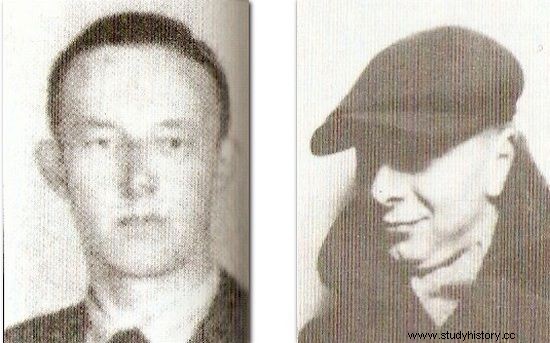
Piotr Downar "Azor" and Mieczysław Eckhardt "Stork". They accompanied Alfred Paczkowski "Wania" on that fateful November day, when he broke his leg.
You could say that he was very lucky anyway. If not for the quick reaction of Piotr Downar "Azor" and Mieczysław Eckhardt "Stork" - his subordinates who accompanied him - he would have drowned. Unfortunately, after being pulled out of the water, it turned out that Paczkowski had a broken leg and he was unable to return to Dawidgródek on his own.
In this situation, "Azor" and "Stork" decided to leave the commander in a hut found near the accident site. However, before they set off to fetch the horses and the cart, they set "Wani" a broken leg and boiled a supply of firewood, as the journey both ways had to take at least a dozen or so hours. After all, they never returned for their supervisor…
The unlucky backpack
After the strenuous march, the Akowcy family found themselves in Dawidgórdek. There, deputy Paczkowski, second lieutenant Marian Czarnecki "Ryś" obtained a transport. The problems began when they both went to the police station to obtain the necessary pass to leave the city. While Eckhardt was arranging the paperwork, one of the policemen became interested in the backpack left on the wagon.
During the search, a submachine gun was found in it. In this situation, of course, Downar was immediately arrested, and Eckhardt, unaware of it, was immediately arrested. Soon the Germans came for Czarnecki, who discovered explosives, weapons and a radio station . The case was serious.
Meanwhile, Paczkowski was becoming more and more worried when no one came for him all day. Finally, on November 20, he heard some footsteps outside the hut's door. It turned out to be Belarusian peasants who came for hay. More guests appeared in a moment. This time, they were Ukrainian and Belarusian policemen who were organizing a roundup of Jews. Upon seeing the lying "Vanya", they immediately demanded that he be identified.
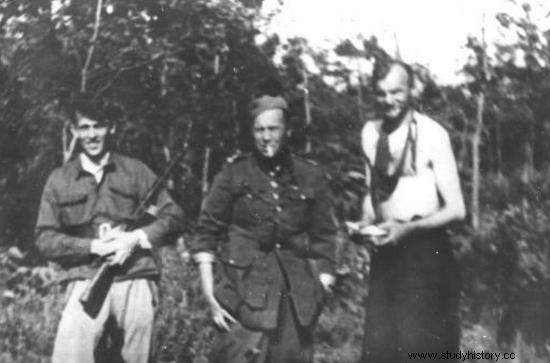
Soldiers of the Home Army Polesie District. First on the right was Alfred Paczkowski Wania. The photo and the caption come from the book by K. Śledziński “Cichociemni. The elite of Polish diversion ”(SIW Znak, 2012)
As he writes in his latest book, Cichociemni. The elite of the Polish diversion "Kacper Śledziński, Cichociemny, had with him documents issued for a citizen of the Fascist Italian Republic of meritorious for the Third Reich, Alfredo Pascoto, who received the estate of the Great Eagle. To make it even more interesting, the document was stamped with the seal of the commissioner for Ukraine, and Erich Koch signed next to it.
After a cursory inspection of the papers, the policemen took the captain to Dawidgródek. There he was stamped by a local medical assistant. Unfortunately, the Germans did not believe the story with Alfredo Pascoto and "Wania" was arrested. Despite being tortured, he insisted that he was Italian all the time .
The remaining arrested Home Army soldiers were also subjected to severe interrogations. During one of such "sessions", "Stork", who tried to resist, died. After some time, all three conspirators were sent to prison in Stolin. There, too, attempts were made unsuccessfully to force Paczkowski to testify. Cichociemny, however, was still constrained. Discouraged by the lack of success, the Germans finally decided in December to transport the Poles to a heavily guarded Pinsk prison.
Rowecki decides to take back "Wania"
Initially, only the news of the arrest of "Azor", "Stork" and "Rysio" reached the structures of the Home Army. Nobody was aware of the fact that "Vania" also came by. But even when the information about this finally reached the commandant of "Wachlarz", Lieutenant Colonel Adam Remigiusz Grocholski "Doktor", he did not intend to lift a finger. As Kacper Śledziński writes in his book: They were written off in the staff calculations. A new commander of Section III - Bolesław Kontrym was appointed .
Fortunately, the commander of the Home Army, General Stefan Rowecki "Grot", had a different opinion. As soon as he heard about everything from his aide, he decided that the release of the prisoners should be prepared immediately. The task was entrusted to Lieutenant Jan Piwnik "Ponury", who was residing in Warsaw at the time.
The latter selected three more from Cichociemni in the form of lieutenants:Jan Rogowski "Czarka" and Wacław Kopista "Kry", and second lieutenant Michał Fijałka "Kawa". Then all four went to Brest. There, in the apartment of Zygmunt Jędrzejewski "Jędras", a plan of the attack on Pińsk prisons was prepared. The matter was not simple, because as he stated - quoted in the book by Kacper Śledziński - "Gloomy:
in Pinsk there are about 100 gendarmes, about 300 city and district militiamen, about 1 battalion of the German army and as many Cossacks [...] in or around the city there are about three thousand Germans and their allies.
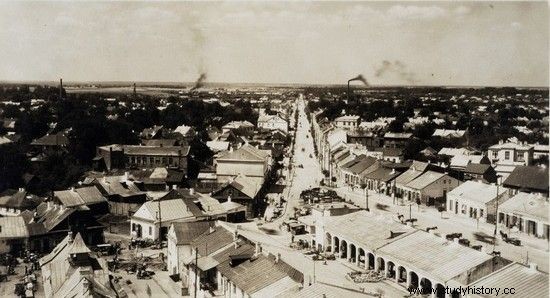
Pinsk. It was from the prison there that, on January 18, 1943, Lieutenant Jan Piwnik "Ponury" recaptured Captain Alfred Paczkowski "Wania"
In addition, the prison was a real fortress, surrounded by a five-meter wall. To get it, you needed not only strength, but also a lot of cunning. Fortunately, Piwnik and his people did not miss him. After a few days of intense deliberation, the plan was ready.
Action against the SS man
Meanwhile, the Germans, after contacting representatives of the Italian army and Koch's law firm, determined that the person they had in their hands was definitely not Alfredo Pascoto. Now, with redoubled enthusiasm, they began to torture Paczkowski. However, thanks to the information provided by "Jelina" - a Home Army soldier working as a guard in a prison in Pińsk - he knew that he had to endure. Help was close.
Indeed, everything was already buttoned up and on January 18, 1943 at five o'clock in the afternoon a gray Opel arrived in front of the prison gate of Pinsk . There was an SS officer inside, who demanded to be admitted. The guard immediately opened the first of the three gates to the nursery. In fact, the imperious officer was Zygmunt Sulima "SS man", one of the sixteen Home Army soldiers who took part in the rescue operation.
As soon as the car was in the prison, the Home Army terrorized the German, demanding in Russian - they pretended to be Soviet partisans - to convince his colleagues to open another gate. The guard, however, tried to fight back and was mowed with a sten burst, alarming his companions.
However, it did not matter that much, as at the same time two groups of four saboteurs were breaking through the prison wall. Coffee and his men got to the headquarters building without any problems. There, the soldiers found the prison commander Hellinger and his deputy Zöllner. The Germans refused to give up the keys and resisted, so they were liquidated.
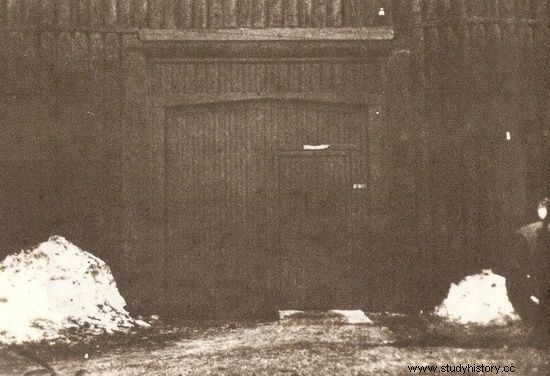
The gate of the Pinsk prison from which the people of "Grim" recaptured "Wania", "Azor" and "Rys".
Now everything turned out quickly. Lieutenant Fijałka breached another wall and found himself behind the backs of the guards guarding the second gate. Meanwhile, they argued with the "SS man" who tried unsuccessfully to convince them to let him in. They were so caught up in the discussion that they completely ignored what was happening behind. Only when "Kawa" put a gun to one of them did they understand that they were trapped. They capitulated without a fight.
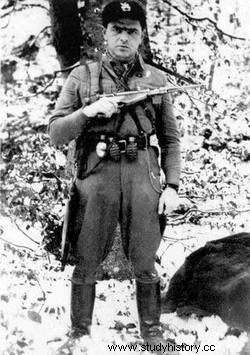
Lieutenant Jan Piwnik "Grim"
At 5:10 pm, the prison courtyard was already in the hands of Poles. Now only the prisoners had to be released. It also went smoothly. Lieutenant Piwnik, using one of the guards, got inside, and his subordinates easily overpowered the guards. "Wania", "Azor" and "Ryś" were free. Likewise, the rest of the prisoners. All the Home Army soldiers got into the Opel and truck Ford, which were already waiting for them, and left Pinsk without being disturbed by anyone. The campaign was a complete success.
Unfortunately, the Germans did not fall for the Soviet partisans behind the entire operation. Five days after a daring attack on the prison, the SS executed 30 hostages in retaliation.
Sources:
- Alfred Paczkowski, Cichociemny Survey , PAX Publishing Institute 1987.
- Jan Szatsznajder, Cichociemni. From Poland to Poland , RSW National Publishing Agency 1985
- Kacper Śledziński, Znak Publishing House, 2012.
